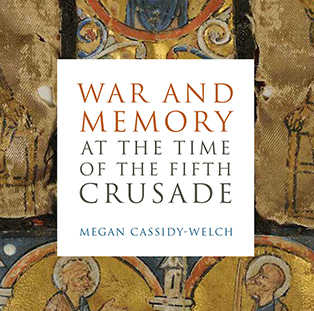 History@UQ is delighted to share news on two new books from our Medievalists!
History@UQ is delighted to share news on two new books from our Medievalists!
Professor Megan Cassidy-Welch has just published her new monograph, War and Memory at the Time of the Fifth Crusade (Penn State University Press, 2019). Cassidy-Welch’s book argues that although war memory is often understood to be a product of modernity, it does have a much longer history. Through a study of the spatio-temporal logic of crusading in the early thirteenth century, Cassidy-Welch reflects on the past in a myriad of ways. Remembering war at this time provided commentators and crusaders with opportunities to rehearse and disseminate the meaning of the crusade through the interplay of individual experience and collective purpose. Remembering war allowed for claims of territorial possession to be extended to new frontiers. Remembering war created communities of belonging by articulating identification with holy war and its aims. Remembering war drew together medieval Christians in shared commitment to the endeavour of crusading wherever it was played out – on the plains and towns of the Holy Land, overlooking the ocean on the coast of Portugal, in monasteries, chapels and priories in France or the Low Countries, or alongside the long river Nile, which was thought to wend its way to the Mediterranean from Paradise itself. In all these ways, the many remembrance projects describing, explaining and justifying the crusade stitched together pieces of the past and the present to fashion a consoling, hopeful, and eternal future. Details of this exciting new work can be found here.
Congratulations are also due to Dr Beth Spacey (Postdoctoral Fellow), who has submitted her manuscript The Miraculous and the Writing of Crusade Narrative to her publishers Boydell & Brewer.
Spacey’s work explores the medieval Latin Christian narratives of the crusades, which are replete with stories of miracles, visions and signs. The Miraculous and the Writing of Crusade Narrative offers the first far-reaching analysis of the importance of these themes to the Latin narrativization of the crusades of 1096 to 1204. By examining narratives produced between c. 1099 and 1250, this book demonstrates the significant contribution that miracles, marvels, visions, dreams, signs and augury made to differing narrative agendas, and argues that the miraculous represented a uniquely powerful tool for authors because of its association with divine agency, a concept that was of central importance to Latin Christian understandings of crusade.
The Miraculous and the Writing of Crusade Narrative will be published in the Crusading in Context series - we look forward to publication in 2020!
